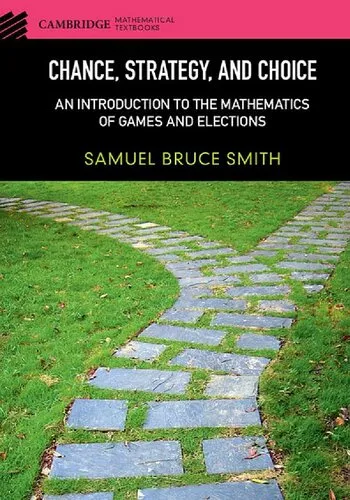Chance, Strategy, and Choice: An Introduction to the Mathematics of Games and Elections (Cambridge Mathematical Textbooks)
4.4
Reviews from our users

You Can Ask your questions from this book's AI after Login
Each download or ask from book AI costs 2 points. To earn more free points, please visit the Points Guide Page and complete some valuable actions.Introduction to 'Chance, Strategy, and Choice: An Introduction to the Mathematics of Games and Elections'
Welcome to the world of mathematics, where decision-making, probability, and strategic interaction intertwine to shape key aspects of human behavior and institutions. 'Chance, Strategy, and Choice: An Introduction to the Mathematics of Games and Elections' invites readers to explore the mathematical theories and principles behind competitive games, strategic decision-making, elections, and voting systems. Blending accessible mathematical techniques with compelling real-world applications, this book is an excellent starting point for readers looking to understand the intricate problems that govern fairness, choice, and rationality in both cooperative and competitive settings.
Written with clarity and purpose, the book is aimed at undergraduate students studying mathematics, economics, political science, or anyone intrigued by the fascinating intersection of mathematics and decision-making. With rich examples from disciplines ranging from political science to economics, probability theory, and game theory, this book demonstrates the surprising power and elegance of mathematics in tackling real-world issues.
Detailed Summary of the Book
The book opens with foundational topics in mathematics, providing the necessary tools for understanding game theory and social choice theory. Later chapters delve deeply into the analysis of games—structured interactions where the outcome depends on the "strategy" of each participant. Here, you'll discover the classic distinctions between zero-sum games, non-zero-sum games, and cooperative games. Concepts like Nash equilibrium and mixed-strategy equilibria are clearly explained with accessible examples that demonstrate their application.
Another significant portion of the book is dedicated to voting theory and the mathematics of elections. How do voting systems reflect the preferences of a group? Are there situations where outcomes from a democratic election contradict fairness? Through examining concepts like Arrow’s Impossibility Theorem and the Condorcet paradox, the book highlights the philosophical and logical challenges inherent in creating ideal voting systems. Additionally, it bridges theoretical issues with practical implications in political decision-making.
From there, the book transitions smoothly into probability, exploring how chance influences games, elections, and decision-making. Through topics like expected value, variance, and risk assessment, readers learn to quantify uncertainty and manage risks effectively. The final chapters synthesize these concepts by showcasing applications in real-world settings, from auction theory to strategic resource allocation and voting systems that strive for equity.
With ample examples, exercises, and a conversational writing style, the text emphasizes understanding over formality. By the end of the book, readers will not only appreciate the elegance of mathematical reasoning but also possess the analytical framework to tackle complex decision-making problems.
Key Takeaways
- Understand the fundamentals of game theory, strategy, and rational decision-making.
- Gain insights into the mathematics of voting systems and social choice theory.
- Learn how probability theory influences games and decision-making through uncertainty and risk analysis.
- Discover real-world applications of mathematical principles across disciplines like economics, political science, and behavioral science.
- Develop an appreciation for the philosophical and mathematical challenges of fairness and rationality in human systems.
Famous Quotes from the Book
"Mathematics is not just a tool to calculate numbers; it is a lens through which we understand the fundamental intricacies of human decision-making."
"In a democracy, elections are the cornerstone of fairness. But paradoxically, perfect fairness is a concept that eludes even the sharpest mathematical minds."
"Games and elections may appear to sit at the opposite ends of human activity, but they share one vital truth: strategy trumps chance only when carefully designed systems allow it."
Why This Book Matters
Modern life is full of decisions, from choosing your next move in a board game to electing world leaders. At the heart of these choices lies mathematics, a discipline not only of precision but also of insight and fairness. 'Chance, Strategy, and Choice' matters because it empowers readers to analyze and solve problems rooted in competition, cooperation, and chance. By demystifying abstract concepts like Nash equilibrium or Arrow’s Impossibility Theorem, the book makes them accessible to students, professionals, and enthusiasts alike.
Furthermore, the book goes far beyond theory. It calls into question the structures we take for granted—electoral systems, economic mechanisms, and social norms—and provides a toolkit for redesigning them to serve fairness and rationality. In a world increasingly driven by data and analytics, this understanding is more crucial than ever.
Ultimately, this book is not just an academic text; it is a guide to critical thinking and informed participation in the systems that govern our lives, blending enjoyment with intellectual rigor. It is for anyone who wants to know why games matter, how fairness can elude us, and why mathematics is a key to making sense of it all.
Free Direct Download
You Can Download this book after Login
Accessing books through legal platforms and public libraries not only supports the rights of authors and publishers but also contributes to the sustainability of reading culture. Before downloading, please take a moment to consider these options.
Find this book on other platforms:
WorldCat helps you find books in libraries worldwide.
See ratings, reviews, and discussions on Goodreads.
Find and buy rare or used books on AbeBooks.
1201
بازدید4.4
امتیاز50
نظر98%
رضایتReviews:
4.4
Based on 0 users review
"کیفیت چاپ عالی بود، خیلی راضیام"
Questions & Answers
Ask questions about this book or help others by answering
No questions yet. Be the first to ask!


